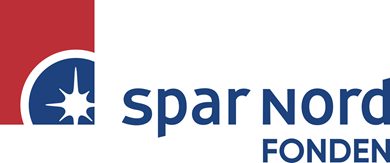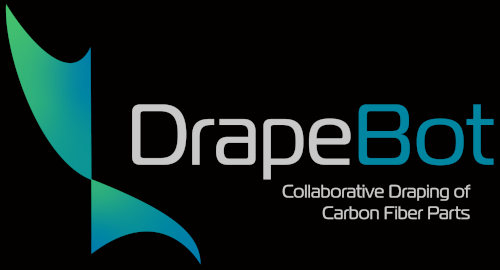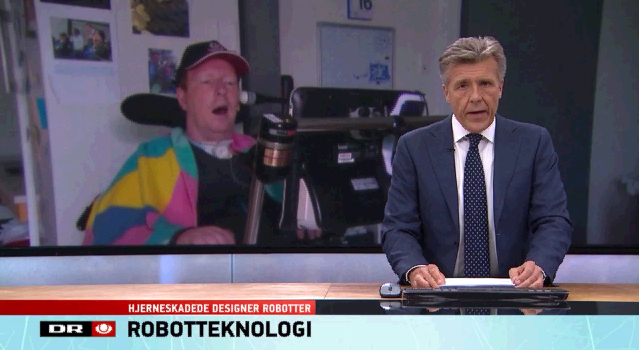Research
Research Projects
-
+
ACMP (Innovationsfonden)
Augmented Celluar Meat Production (ACMP): The project is focused on a collaborative robot cell concept as an alternative to the serial production line that is currently used in major slaughterhouses. With a robot cell, where a robot and an operator share tasks and workload, we get the strength of the robot and the flexibility of the operator.
The project is focused on a collaborative robot cell concept as an alternative to the serial production line that is currently used in major slaughterhouses. With a robot cell, where a robot and an operator share tasks and workload, we get the strength of the robot and the flexibility of the operator. This will help reduce the repetitive stress injuries that plague workers in the industry and it will ease the transition to fully automated robots that can perform the entire process by themselves. The project requires innovation in the way humans and robots collaborate and the development of robots that can adapt to the high variation in both products and the interaction with humans.
We are focusing on safe and efficient communication for collaboration between operator and robot, aided by AR technologies, as a prerequisite to establishing and maintaining trust between operator and robot. There are two stages to developing safe HRC in the workplace. The first stage is developing the interaction methods facilitating the collaboration itself. This involves development and evaluation of AR interfaces for the system to inform the operator on current task objectives and the expected movements from the robot. It also involves being able to track the operator’s motions in order to interpret their their level of trust so the system can adapt its motion patterns accordingly. The second stage is developing methods measuring the operator’s level of trust towards the collaborative robot while working in close proximity to it. Because the robot will be equipped with either sharp tools or powerful gripping tools, there is a high risk that the operator will feel unsafe around it, which will likely harm efficiency in high-intensity production lines. The goal is to develop methods for the system to interpret the operator’s trust towards the robot based on their movement correlated with the robot’s actions and the current task. We will use this to have to robot adapt its movement patterns and communication according to the comfort of the operator to maintain their trust
throughout the collaboration.Contact: Matthias Rehm

-
+
BYOR (Helsefonden, Spar Nord Fonden)
Build your own robot (BYOR) for independent living is an exploratory project with the overall goal of developing a concept of social robots as do-it-yourself aid that can be broadly used by different groups of people with cognitive and physical impairments.
Build your own robot for independent living is an exploratory project with the overall goal of developing a concept of social robots as do-it-yourself aid that can be broadly used by different groups of people with cognitive and physical impairments. Based on empirical data from a residential home for people suffering from severe impairments due to acquired brain injury, the project focuses on developing robots for daily cognitive guiding and reminding tasks. The vision for the project is to create a toolbox for developing individualized solutions that match the need of each specific citizen. By creating the po
ssibility for experimenting with the task of building real and functional robots, we aim at increasing citizens’ independence and quality of life, while at the same time strengthening social competences and supporting the feeling of being in control over one’s own life. The project thus has two layers: (i) Co-creation of individualized social robots, and (ii) evaluation of the robot in use.
Project website: http://byor.ehci.dk
Contact: Matthias Rehm
This project has been partly funded by Helsefonden and Spar Nord Fonden.


-
+
Brain-controlled exoskeletons for stroke rehab (Velux Fonden)
Technology transfer from prototype to home use
A new promising rehabilitation tool is a brain-controlled exoskeleton (also known as a brain-computer interface) that can help the patient execute the intended movement of the affected limb. This rehabilitation tool is still in the development/evaluation phase. Thus, there is very limited knowledge about how this tool must be designed and implemented, so the patient wants to use it and it is possible to move it out into the rehabilitation clinic or the home of the patient. This will be investigated in a 3-year project supported by VELUX FONDEN.
The primary investigator is Mads Jochumsen with a collaborative research team consisting of Birthe Dinesen, Hendrik Knoche (Department of Architecture, Design and Media Technology), Troels W. Kjær (Roskilde Hospital, Copenhagen University), and Preben Kidmose (Århus University).
Project website: https://www.labwelfaretech.com/projects/bci-exoskeleton/
Contact: Hendrik Knoche
-
+
DecoChrom (Horizon 2020)
The DecoChrom project elevates printed graphics products to the age of interactivity, and empowers the creative industries with the tools and innovative advanced material sets to design and build aesthetically pleasing practical human interfaces to smart consumer goods and environments. The DecoChrom consortium develops printed electrochromics (EC) as the mass producible, print industry compatible, ultra low-power interactive graphics solution for ambient intelligence.

The DecoChrom project elevates printed graphics products to the age of interactivity, and empowers the creative industries with the tools and innovative advanced material sets to design and build aesthetically pleasing practical human interfaces to smart consumer goods and environments. The DecoChrom consortium develops printed electrochromics (EC) as the mass producible, print industry compatible, ultra low-power interactive graphics solution for ambient intelligence. DecoChrom will scale-up the production of advanced composite materials into innovative ink EC colours, manufacturing process on different materials, wide dissemination and creation of EC toolkits to introduce electrochromics to designers, makers and the printing industry, and finally the co-creation of several creative industry lead end-user prototypes and pilots for architecture, interior design, lifestyle and sports.
The project brings together a strong interdisciplinary consortium of 15 partners, industry and research balanced, with state-of-the-art backgrounds in design, chemistry, printing, coatings and laminates, electronics system integration, and complete electrochromics solutions.
Project website: https://decochrom.com/
Contact: Markus Löchtefeld
This project has received funding from the European Union’s Horizon 2020 research and innovation programme under Grant Agreement No. 760973.

-
+
Digital Culture (Horizon 2020)
The project aims to create a sustainable and efficient education program dedicated to adult learners with low digital skills and low-qualified adults involved in the culture and heritage sector from Romania, Italy, Austria, Denmark, Lithuania, UK and Ireland.

The project aims to create a sustainable and efficient education program dedicated to adult learners with low digital skills and low-qualified adults involved in the culture and heritage sector from Romania, Italy, Austria, Denmark, Lithuania, UK and Ireland. The main outcomes include the Digital Skills for Culture MOOC Course available online and through blended learning, the Integrated Virtual Learning Hub including an innovative mobile app aimed at low-skilled adults, the Digital Skills e-assessment tool and Open Badges for Digital Skills. Together they will provide important new opportunities for low-skilled adults to access knowledge, gain new competences including digital skills and improve their chances of finding employment or performing better in their current employment.
Project website: http://www.digiculture.eu/
Contact: Hendrik Knoche
This project has received funding from the European Union’s Horizon 2020 Erasmus+ KA204 - Strategic Partnerships for adult education program.

-
+
Drapebot (Horizon 2020)
The DrapeBot project aims at human-robot collaborative draping. The robot is supposed to assist during the transport of the large material patches and to drape in areas of low curvature.

The DrapeBot project aims at human-robot collaborative draping. The robot is supposed to assist during the transport of the large material patches and to drape in areas of low curvature. The role of the human is to drape regions of high curvature. To enable an efficient collaboration, DrapeBot develops a gripper system with integrated instrumentation, low-level control structures, and AI-driven human perception and task planning models. All of these developments aim at a smooth and efficient interaction between the human and the robot. Specific emphasis is put on trust and usability, which will be the main contribution of the HRI lab to the project. The DrapeBot project runs over a period of four years from January 2021 to December 2024.
Project website: Drapebot.eu
Contact: Matthias Rehm

This project has received funding from the European Union’s Horizon 2020 research and innovation programme under grant agreement No 101006732.
-
+
EXOTIC (AAU)
EXOTIC - Assistive Personal Robotics Platform With An Exoskeleton Using The Tongue For Intelligent Control As A Use Case
The Exotic project is an interdisciplinary effort that aims at providing tetraplegics a way to act on their environment - an exo-skeleton arm controlled through an intra-oral interface.
Project website: https://www.strategi.aau.dk/Forskning/Tv%c3%a6rvidenskabelige+forskningsprojekter/EXOTIC/
Contact: Hendrik Knoche
-
+
Future Patient II (Aage & Johanne Louis-Hansens Fonden)
coming soon
coming soon
Contact: Hendrik Knoche
-
+
HRI@TECH (AAU)
The aim of this strategic research initiative is to establish a cross-departmental HRI research lab at the Technical Faculty of IT and Design.
The lab brings together researchers from the departments of Architecture, Design, and Mediatechnology (CREATE), Computer Science (CS), Electronic Systems (ES) and Planning and Development (PLAN) in order to create synergies between the different research perspectives on human robot interaction.
Contact: Matthias Rehm
-
+
Techstronaut (Nordea Fonden, Utzon Center)
Techstronaut is a laboratory where children and young people test and experiment with digital technologies together with Utzon teachers and engineering students. It's all about technology in relation to architecture and design. From Minecraft / LEGO to the architect's drawing programs, 3D printing, robotics, virtual reality, a new world of technology-based co-creation is opened.
Techstronaut is a laboratory where children and young people test and experiment with digital technologies together with Utzon teachers and engineering students. It's all about technology in relation to architecture and design. From Minecraft / LEGO to the architect's drawing programs, 3D printing, robotics, virtual reality, a new world of technology-based co-creation is opened.
Project website: https://utzoncenter.dk/da/indhold/om-arkitektur-er-en-leg-7201
Contact: Hendrik Knoche

Past Projects
-
+
focal
Formal Ontology engineering for Culturally-Aware technoLogies (FOCAL): The era of globalization has seen an increase in immigration and communication among people from diverse cultures. Issues of miscommunication or friction resulting from cultural differences are of growing interest to technologists, which has led to the emergence of a research field on culturally-aware technology. A “culturally-aware system” refers to any system where culture-related information has had some impact on its design, run time or internal processes, structures, and/or objectives. Cultural knowledge bases are mandatory for developing culturally-aware technologies.
The era of globalization has seen an increase in immigration and communication among people from diverse cultures. Issues of miscommunication or friction resulting from cultural differences are of growing interest to technologists, which has led to the emergence of a research field on culturally-aware technology. A “culturally-aware system” refers to any system where culture-related information has had some impact on its design, run time or internal processes, structures, and/or objectives. Cultural knowledge bases are mandatory for developing culturally-aware technologies. However, existing repositories of cultural information are not easy to use, and frequently refer to a limited set of very specific problems or domains. It is thus extremely difficult for designers and developers of culturally-aware systems to access cultural information of good quality related to the specific issues they want to address in their project.
This Danish-Japanese-Brazilian network was funded by the Forsknings- og Innovationsstyrelsen. Project partners were Prof. Riichiro Mizoguchi (University of Osaka, Japan) and Prof. Seiji Isotani (University of Sao Paulo, Brazil).
Contact: Matthias Rehm
-
+
pbl
PBL development 2.0 project – Drop-out prediction from digital learning for retention: This project applies machine learning for the identification of students at risk of dropping out of courses or their education from digital learning data. This includes activities such as quizzes, exams, and interaction data within a digital learning environment.
PBL development 2.0 project – Drop-out prediction from digital learning for retention: This project applies machine learning for the identification of students at risk of dropping out of courses or their education from digital learning data. This includes activities such as quizzes, exams, and interaction data within a digital learning environment.
Contact: Hendrik Knoche
-
+
sral
Social Robots for Assisted Living (SRAL): The demographic development shows the need for technical solutions to previously social work areas due to the simple fact that in the long run not enough people will be available in the work force. A crucial area in an ageing society is the care and treatment of elderly people who should be encouraged and supported in a self guided life. One possibility in this complex and challenging endeavor is the use of robots as social companions that allow for triggering cognitive and social activities.
The demographic development shows the need for technical solutions to previously social work areas due to the simple fact that in the long run not enough people will be available in the work force. A crucial area in an ageing society is the care and treatment of elderly people who should be encouraged and supported in a self guided life. One possibility in this complex and challenging endeavor is the use of robots as social companions that allow for triggering cognitive and social activities. On the technical side this opens up a plethora of challenging research questions ranging from engineering aspects like social signal processing or path finding to interaction design aspects like social behavior modeling or emotional interactions. Additionally, the introduction of robots into areas that are so far viewed as the sole realm of human interactions gives rise to ethical considerations and uncertainties about the acceptance of these systems.
Contact: Matthias Rehm

